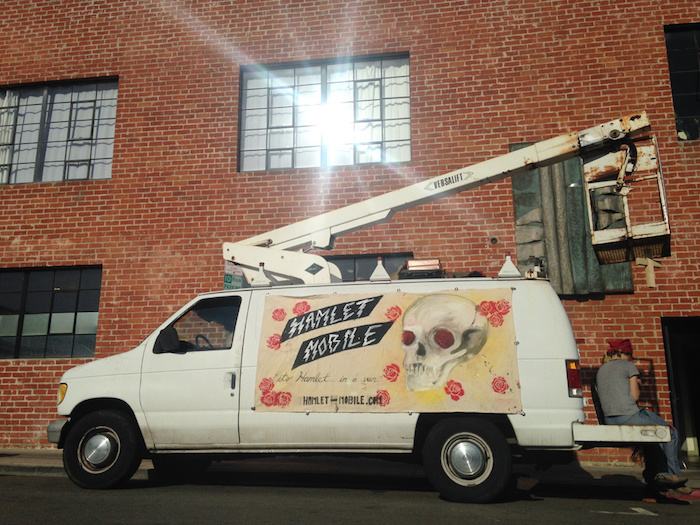We climbed onto pillows, pushed up against the back of the driver’s and passenger’s seats, as the doors to the van closed. Hamlet lay on the floor, drinking a beer and wearing sock garters that I don’t think were holding anything up. He didn’t speak. Was he sizing us up, maybe waiting to see if we would say something first? Or was he just catching his breath? He was halfway through a three-hour marathon of performing the same 15-minute show on repeat; perhaps all his psychic energy had been drained by our 9:30 slot.
Did I say van? Yes, I did. My friend and I were the only two audience members in a graffiti-covered panel van, parked on an utterly quiet street a block off North Hollywood Park. With so many odds and ends and boxes lashed to the roof, you might mistake it for some dreamer’s van, recently arrived in the City of Angels. We were here to see “Breakup Sex,” one of the eight short plays put on by Hamlet-Mobile, which performs imaginative interpretations of scenes from Shakespeare’s The Tragedy of Hamlet, Prince of Denmark.
Finally, Hamlet started speaking. But this was no Hamlet I’d ever heard before. In modern speech, he talked about meeting various girlfriends’ parents, describing how he had endured breakups with no less than 42 women. He told us how damaged he was, how 42 women is not something to boast about when the breakups are because of your own inadequacies. I wanted to tell him it was okay, to interact with him. But some piece of theater-going decorum kept the words stuck in my throat. I wondered if anyone else that night had spoken up, introduced themselves, offered support.
Hamlet-Mobile is the very definition of an intimate experience. Each performance is designed for one to four audience members, crammed into a van with the performers as far away as you are right now to your computer screen or your phone. This distance, or lack of it, provides the central tension that Capital W — a team comprised of writer/director Lauren Ludwig and producer Monica Miklas — is going for. Does this distance encourage people to behave differently? Do most people try, as I did, to maintain some metaphorical distance from the performance, or does the need to participate in the conversation become more important?
Hamlet’s silence at the outset was one of the outstanding elements of the performance. It forced us, as I later confirmed with my friend, to make a choice about how we were supposed to act as audience members.
When Hamlet’s soliloquy ended there was a knock on the door. Ophelia, in a tutu with mascara running down in streams beneath her eyes, entered through the back door of the van. She had snuck there without her father’s knowledge or consent to return a few odds and ends, signifying the end of the pair’s relationship. Anyone familiar with the play knows what’s happening, and what’s about to happen. There were now four of us in the van, but the performance has transitioned away from confronting the audience to the two actors being immersed in the scene. Slowly, the actors dropped into Shakespearean language, letting the end of Act III sc. 1 bleed into their performance.
Hamlet’s contemporary soliloquy, which thankfully replaced “To be or not to be,” began to take on more meaning. Not only was it an interpretation or performance inspired by Hamlet, it was as if Ludwig has provided the audience with a glimpse into how she interprets Hamlet’s own motivations. She presents his state of mind; the psychology, neuroses, and failures which constitute the man; his conception of his self-worth, “that it were better my mother had not borne me.” We understand him better, even if we still think him utterly cruel to have treated Ophelia as he does, wishing her “a plague for thy dowry.”
Shakespeare somehow remains impervious to anachronism, as Ludwig’s and Miklas’s modern interpretation shows. Hamlet’s motivations and state of mind can be updated, overlayed on top of words that are over 400 years old. There is no frozen-in-amber quality to his plays, and the Capital W crew and their actors have found a way to make Hamlet interesting in yet another way, all while constraining themselves to a stage that fits perfectly into the streets of Los Angeles in 2016.
Hamlet-Mobile runs through November 19th at various sites around Los Angeles.


